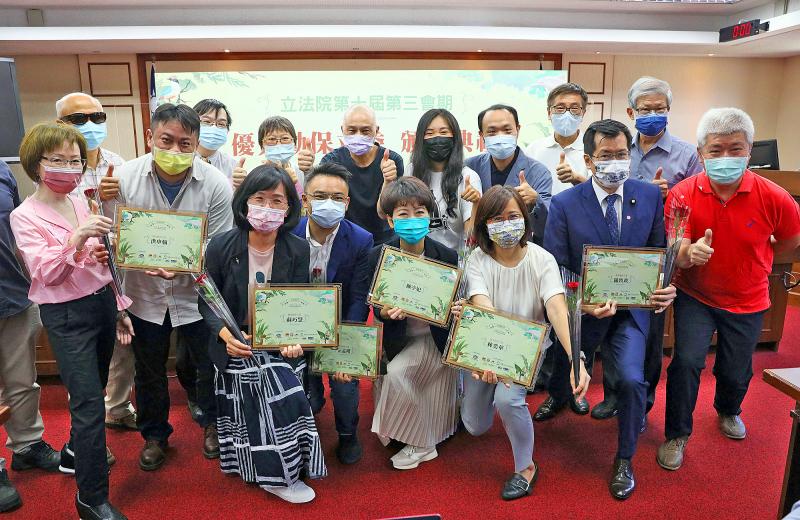Nine legislators were on Wednesday named Outstanding Lawmakers for Animal Protection by a coalition of advocates for their efforts to improve animal protection regulations.
Protecting animals takes more than just words and social media posts, it takes concerted action to change policies, Taiwan Animal Protection Monitor Network secretary-general Ho Tsung-hsun (何宗?) told a ceremony at the Legislative Yuan in Taipei.
In the previous legislative session, more legislators proposed laws to protect animals than ever before, with 21 proposing 25 bills for deliberation, Ho said.

Photo: CNA
Candidates for the award, given by the Animal Protection Legislative Campaign Coalition, expressed concern for a range of issues, expanding beyond household pets and wildlife to include livestock, laboratory subjects, animal performers and more, he said.
Ho urged legislators to continue correcting discrepancies among different levels of regulation and prejudicial standards for different species, as well as improving mechanisms for enforcement.
The coalition recognized Democratic Progressive Party (DPP) legislators Chen Ting-fei (陳亭妃), Lo Chih-cheng (羅致政) and Su Chiao-hui (蘇巧慧), and Chinese Nationalist Party (KMT) Legislator Hung Meng-kai (洪孟楷) for their proposal to amend the Veterinarian Act (獸醫師法) to promote a system for veterinary assistants, which has passed a third reading.
Chen was also commended for proposing a food and agriculture education bill and facilitating an emergency medication system for pets.
The coalition also highlighted Hung for his concern over disease prevention among animals at Nantou County’s Cingjing Farm (清境農場), while Lo wrote a complete ban on animal traps into the Animal Protection Act (動物保護法).
New Power Party Chair Chen Jiau-hua (陳椒華) won the award for a number of actions, including her support for adding animal protections into the Constitution, instructing the Council of Agriculture’s Bureau of Animal and Plant Health Inspection and Quarantine to implement basic veterinary training for lab technicians, and looking out for the welfare of animals at Tainan’s Wanpi World Safari Zoo and Xpark in Taoyuan.
KMT Legislator Lin Yi-hua (林奕華) also advocated for the inclusion of the right to life for plants and animals in the Constitution, while also pushing for an investigation into the deaths of water buffalo on Yangmingshan (陽明山) and working to lift bans on pet ownership in apartment buildings.
DPP Legislator Tsai Shih-ying (蔡適應) paid special consideration to a ban on pet ownership in military multipurpose dormitories, for which he was given the award, in addition to his work promoting constitutional reform and the welfare of livestock, lab animals and marine life.
Also involved in the movement to enshrine animal rights in the Constitution is DPP Legislator Hung Sun-han (洪申翰), who was given a commendation for proposing an amendment to encourage technological alternatives to animal testing.
DPP Legislator Yang Yao (楊曜) was recognized for proposing an amendment to the Animal Protection Act requiring the regular disclosure of information regarding inspections of animal breeders and sellers.
The coalition was founded in February last year by members from animal rights organizations to lobby the Legislative Yuan to further animal rights.

Chinese Nationalist Party (KMT) Chairman Eric Chu (朱立倫), spokeswoman Yang Chih-yu (楊智伃) and Legislator Hsieh Lung-chieh (謝龍介) would be summoned by police for questioning for leading an illegal assembly on Thursday evening last week, Minister of the Interior Liu Shyh-fang (劉世芳) said today. The three KMT officials led an assembly outside the Taipei City Prosecutors’ Office, a restricted area where public assembly is not allowed, protesting the questioning of several KMT staff and searches of KMT headquarters and offices in a recall petition forgery case. Chu, Yang and Hsieh are all suspected of contravening the Assembly and Parade Act (集會遊行法) by holding

PRAISE: Japanese visitor Takashi Kubota said the Taiwanese temple architecture images showcased in the AI Art Gallery were the most impressive displays he saw Taiwan does not have an official pavilion at the World Expo in Osaka, Japan, because of its diplomatic predicament, but the government-backed Tech World pavilion is drawing interest with its unique recreations of works by Taiwanese artists. The pavilion features an artificial intelligence (AI)-based art gallery showcasing works of famous Taiwanese artists from the Japanese colonial period using innovative technologies. Among its main simulated displays are Eastern gouache paintings by Chen Chin (陳進), Lin Yu-shan (林玉山) and Kuo Hsueh-hu (郭雪湖), who were the three young Taiwanese painters selected for the East Asian Painting exhibition in 1927. Gouache is a water-based

Taiwan would welcome the return of Honduras as a diplomatic ally if its next president decides to make such a move, Minister of Foreign Affairs Lin Chia-lung (林佳龍) said yesterday. “Of course, we would welcome Honduras if they want to restore diplomatic ties with Taiwan after their elections,” Lin said at a meeting of the legislature’s Foreign Affairs and National Defense Committee, when asked to comment on statements made by two of the three Honduran presidential candidates during the presidential campaign in the Central American country. Taiwan is paying close attention to the region as a whole in the wake of a

OFF-TARGET: More than 30,000 participants were expected to take part in the Games next month, but only 6,550 foreign and 19,400 Taiwanese athletes have registered Taipei city councilors yesterday blasted the organizers of next month’s World Masters Games over sudden timetable and venue changes, which they said have caused thousands of participants to back out of the international sporting event, among other organizational issues. They also cited visa delays and political interference by China as reasons many foreign athletes are requesting refunds for the event, to be held from May 17 to 30. Jointly organized by the Taipei and New Taipei City governments, the games have been rocked by numerous controversies since preparations began in 2020. Taipei City Councilor Lin Yen-feng (林延鳳) said yesterday that new measures by